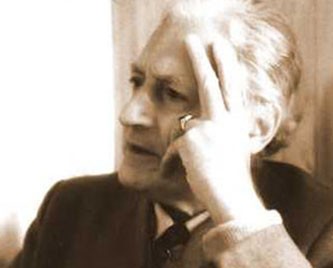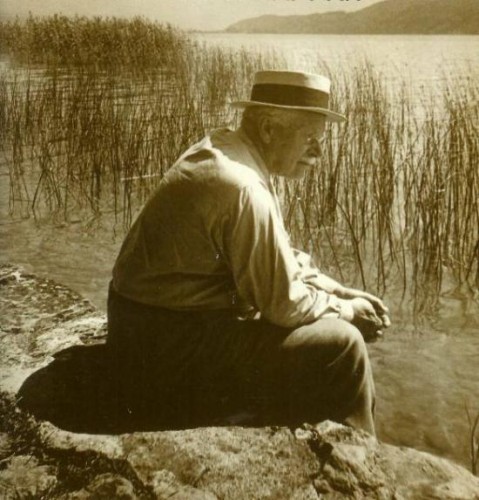Ex: http://www.counter-currents.com/
Translated by Alex Kurtagić
Author’s Note:
This is a translation of the article by Serrano published by the Chilean newspaper El Mercurio in 1961, following Carl Jung’s death.
It’s six in the morning, 8 June. I open the doors to my room in New Delhi—doors which open to a small white terrace, already fulgurating with sunlight. The tremendous June heat starts early in the day. I am partially naked, and in a moment I will begin my yogic exercises of sun adoration, “Suryanamaskar.” The trees’ incredible verdure, even in this weather, and the birdsong of infinity, greet me. A servant, who is from around these parts, approaches me with that measured step of the Indians and says to me, “Salam, Sahib.” It’s his respectful greeting. He hands me a piece of paper. It’s a telegram. I open it without hurry, almost absent-mindedly. I see that it comes from Zurich and it surprises me that this is the case. I begin reading and I am perplexed. The telegram reads as follows: “Dr. Jung died peacefully yesterday at noon. Best wishes.” It is signed by Beiley and Jaffe: the young lady that kept him company, who walked him home—an extraordinary woman—; and his private secretary, a Swiss citizen.
A great sadness immobilizes me right there—my eyes are moist, perhaps because of the intense sun, or perhaps not. It was so recently that I had been with Dr. Jung, at his house in Küsnacht, next to Lake Zurich. I might have been the last foreign friend to see him. The news has hit me in the depths of my soul. I have had the enormous fortune of having been prefaced by Jung—that, having been the first and last time that he penned a preface for a purely literary work.
I received a letter from him at the time of our last year’s earthquakes in Chile. He said, “Even if modern men of science will not accept it, there is a relationship between Nature and the soul. Mother Nature now attunes itself to our civilization and begins also to visit destruction. Unfortunately, it has been your country’s turn this time. I have thought of Chile so much lately!”
 The remembrance flies, I see its image, it’s on my mind. So very recently I arrived at his house, amid a fine rain. Jung’s house is in the outskirts of Zurich, in Künsnacht. At the entrance’s portal there is a phrase in Latin that reads, more or less, “Think or not in God. He is always present.” Inside there are paintings and beautiful objects, antique engravings, mediaeval paintings. I was received by Ms. Beiley, who invited me into a small living room, where she served us tea.
The remembrance flies, I see its image, it’s on my mind. So very recently I arrived at his house, amid a fine rain. Jung’s house is in the outskirts of Zurich, in Künsnacht. At the entrance’s portal there is a phrase in Latin that reads, more or less, “Think or not in God. He is always present.” Inside there are paintings and beautiful objects, antique engravings, mediaeval paintings. I was received by Ms. Beiley, who invited me into a small living room, where she served us tea.
We talked about Dr. Jung. She told that me he had not been well during the last few days, feeling very tired as a result of working intensively on a 80-page essay he had written in longhand, as usual, directly in English for an American publication, and due to appear soon with the title “Man and his Myths.” Ms. Beiley is very worried, as Jung has said to her, “I wish to go, but you tie me here.” She does not believe him, as she thinks that Dr. Jung is still interested in life and the Earth. He has told me that “to die is also to go to Jung’s collective Unconscious, only to then, from there, go back to the realm of forms, of forms . . .” Hesse has also told me that “Jung is a giant, a giant mountain in our time.” And he has asked me to forward Jung his greetings—“the steppe wolf’s greetings,” he has said.
Jung has been unwell, it is true, but he’s afflicted by no illness. That day he had felt better and even got up to receive me. Ms. Beiley asks that we go upstairs, but also that I don’t stay long so as not to tire him. We entered his study. And there was Jung, on a chair, next to the window facing the lake. He’s wearing a Japanese robe that makes him look like a Zen Buddhist monk, an old samurai, or a magus from earlier times. He is haloed by a crepuscular light, and he is surrounded by alchemical engravings and a great paining of the Hindu god Shiva on the summit of Mount Kailash.
He smiles with that smile of his, filled with cunning, wisdom, and benevolence. He reaches for his pipe, but fails. I tell him, “What a beautiful Japanese robe.” It is a ceremonial robe. Out of my pocket I take box from Kashmir that I have brought him as a present. He looks at it and says, “It’s made out of turquoise.” And then he adds, “I’ve never been to Kashmir. I traversed the South of India; Madora—all those very ‘interesting’ places.” He then talks to me about the Hindus and the Chinese; he makes reference to a book by a Chinese master of Zen Buddism, whose name I can’t remember now, and he tells me that it is the best he has read on the subject. I transmit Hermann Hesse’s greetings and I relate my conversation with that writer about death. I explain that I have asked him whether it is important to know that there is something beyond death. Jung meditates for a while and states that the question has been posted incorrectly—that I should have asked whether there is reason to believe that there is something beyond death.
 I now ask Dr. Jung, “And what do you believe? Is there?” He answers, “if the human mind can operate independently of the brain, then it operates independently of space and time. And if it operates independently of space and time, it is incorruptible.”
I now ask Dr. Jung, “And what do you believe? Is there?” He answers, “if the human mind can operate independently of the brain, then it operates independently of space and time. And if it operates independently of space and time, it is incorruptible.”
And what do you believe, Dr. Jung? What do you think?
I have seen men wounded by bullets to the brain during the war who have a lost all brain function and who nevertheless have dreams and are able to remember them afterwards. What is it they dream? There are small children, who don’t yet have a defined self, whose consciousness is diffuse and spread over their bodies, yet who have deep and personal dreams that mark them for the rest of their lives. There is no self there. What is that other they dream?
Do you believe, Dr. Jung, that there exists something like a subtle body, an astral body, the “Linga-Sarira” of Hindu philosophy, which detaches itself upon death?
I don’t know. I have seen objects materialize and mediums move objects from afar without touching them with their physical bodies.
And Dr. Jung continues:
Sometime ago I was very ill, almost in a coma; everybody thought that I would die and maybe even that I was suffering greatly, because in this condition one’s body makes people believe that one is suffering. But in reality I felt as if I were floating and experienced a marvelous sense of freedom. I remembered it afterwards.
Dr. Jung always wore on his right hand a ring with a Gnostic gem. An Egyptian gem. We spoke about the meaning of that ring, and he explained, “All these symbols are alive in me.” His memory and culture, even at the age of 85, was incredible.
At times he spoke like a poet, like a magus, like a mystic. One time he said to me, “My message is not wholly understood; only poets understand it.”
Now I ask him:
What will happen to mankind in the coming technological supercivilization? Do you think that, in twenty years, anyone will care about the spirit of symbols, in the midst of the era of interplanetary journeys, with the Sputniks, the Gagarins, and the Shephards? Will not the spirit come to appear passé?
Dr. Jung smiles cunningly and states:
Sooner or later man will have to return to himself, even if from the stars. All this that is happening now is an extreme form of escapism, because it is easier to reach Mars than to find oneself. If man doesn’t find himself, then he faces the greatest of dangers: his own annihilation. On journeys into outer space there is also an unconscious attempt to solve the gravest of all problems that man will have to face in the future: overpopulation.
Dr. Jung was going to continue talking about this very important topic when Ms. Beiley entered the room to say that Dr. Jung’s daughter and son-in-law were waiting. I had not fulfilled my promise of a brief conversation.
But now I know it doesn’t matter, because mine was to be his last interview. And something perhaps told me that this was the case, for when I reached the door I stopped and turned my head. Jung sat there staring at me, with a soft smile and lifting his hand in a gesture of farewell. His last one. The hand with the Gnostic ring. I bowed, respectfully.
Source: http://www.wermodandwermod.com/newsitems/news251020101138...





 del.icio.us
del.icio.us
 Digg
Digg
Les commentaires sont fermés.